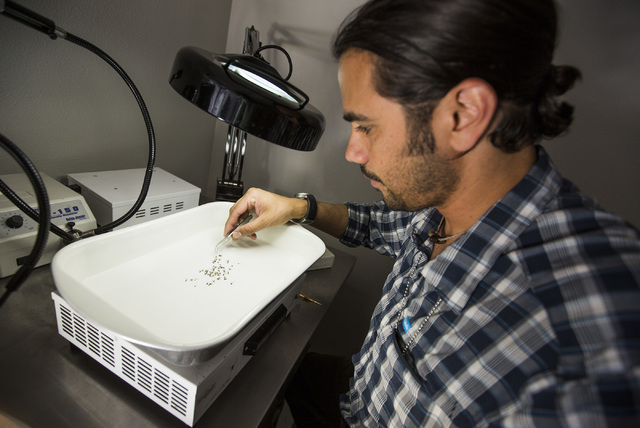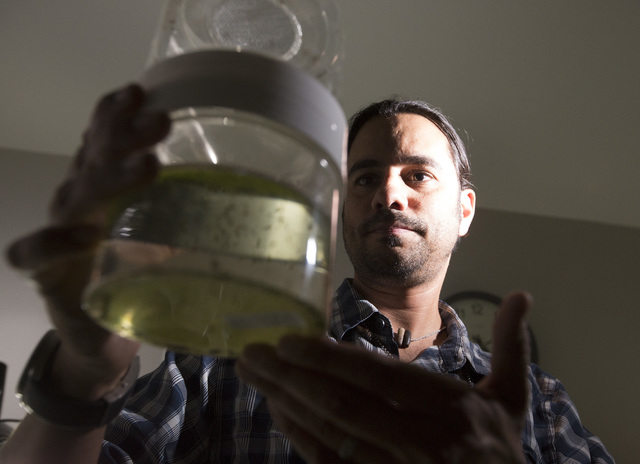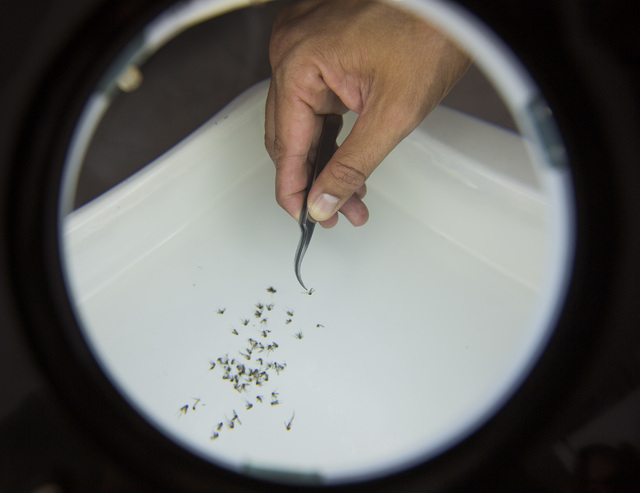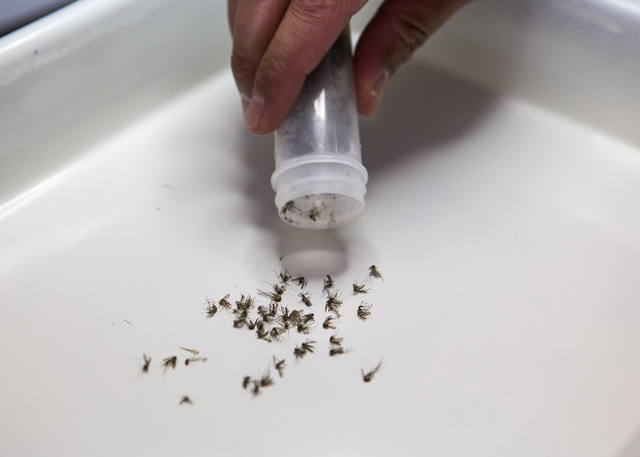County officials urge residents to report green pools where mosquitoes can breed
A swampy growth of algae, bacteria and even some tadpoles is how Clark County Commissioner Marilyn Kirkpatrick describes some of the green pools she’s seen in the Las Vegas Valley over the years.
At a news conference Monday, Kirkpatrick emphasized the need for public attention to green pools and mosquito breeding, especially in light of concern over the Zika virus and the potential for the spread of West Nile virus.
Green pools, which can be full of algae and bacteria, provide a place for mosquitoes to lay eggs, according to the county. Those mosquitoes can carry deadly diseases such as West Nile.
Although there have been no documented cases of mosquito-to-human transmission of Zika in Nevada or any other state, the county still wants to spur residents to take action as a precaution, encouraging locals to report green pools to code enforcement agencies, Kirkpatrick said.
Zika is a typically mild illness, primarily spread by the Aedes mosquito, that has raised concerns over its link to birth defects in babies born in South America.
As of April 27, the CDC reported 426 Zika cases in U.S. states, all of which were travel associated or sexually transmitted.
There have been no locally transmitted Zika cases in the United States, although there have been some local cases in U.S. territories.
The types of Aedes mosquito associated with the spread of the disease have not been located in Clark County. Two new cases of Zika have been reported in the past week in Southern Nevada, bringing the total number of cases statewide to six, according to the Southern Nevada Health District.
A Clark County man who traveled to American Samoa was tested March 31 for the disease, and his test came back positive April 27. Another Clark County adult tested positive, but the health district declined to release details at that individual’s request.
Although 80 percent of people with West Nile will not show symptoms, those who do can experience fever, headache, body ache, joint pain, vomiting, diarrhea, rash or other symptoms. In more serious cases, people can develop neurological conditions such as meningitis, said Karen Duus, Touro University associate professor of microbiology and immunology.
Since 2011, Clark County has reported 31 cases of West Nile and four deaths, according to health district statistics obtained by the county.
West Nile is spread when a mosquito bites an infected bird before biting a human, Duus said.
In the past two years, no West Nile deaths have been reported in Southern Nevada, according to the county.
Local enforcement agencies typically encourage people during summer months to report green pools and mosquito activity. Most West Nile infections occur from June into September, Duus said.
“Every year because we are educating the public, the numbers are decreasing, and we want to keep on that trend,” Kirkpatrick said.
Aedes aegypti and Aedes albopictus mosquitoes, the primary carriers of the Zika virus, typically breed in small, dark places with water, such as the inside of a wet tire or a tree hole, said Vivek Raman, environmental health supervisor with the Southern Nevada Health District.
An effort encouraging locals to eliminate any standing water from their properties can aid overall mosquito prevention efforts, Raman said.
Kirkpatrick agreed.
“Anytime that you have standing water, you create an environment for mosquitoes to actually breed, and that’s what we want to avoid,” she said.
On the heels of Las Vegas’ wettest April on record, Raman suggested residents check around their homes for standing water.
Although the health department doesn’t handle mosquito abatement calls or remediate green pools, its workers trap and submit hundreds of thousands of mosquitoes for disease testing annually.
Since concerns over Zika began to grow, the health district has purchased more traps designed to attract Aedes mosquitoes and established questions to ask people who may have been exposed to the virus.
Raman said his team has set 74 traps since limited mosquito surveillance began in February, but it doesn’t begin submitting mosquitoes for disease testing until late May or June.
“We don’t have a lot of breeding prior to May just because of weather patterns and temperature,” he said.
The keys to avoid West Nile and Zika are to dress appropriately, use mosquito repellent with DEET, ensure all open windows have screens and take other precautions to keep mosquitoes away, Raman said.
Contact Pashtana Usufzy at pusufzy@reviewjournal.com or 702-380-4563. Find @pashtana_u on Twitter.

































